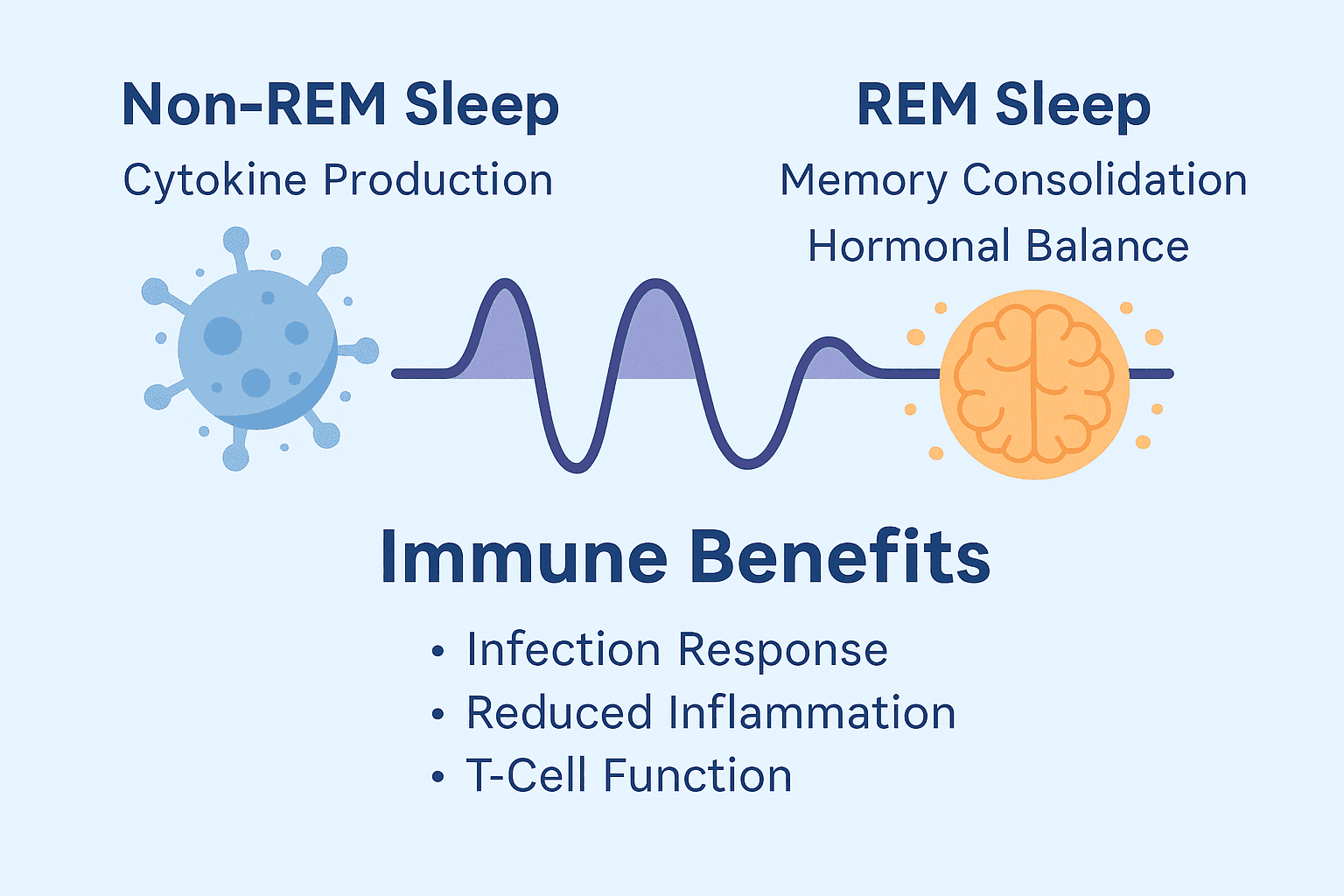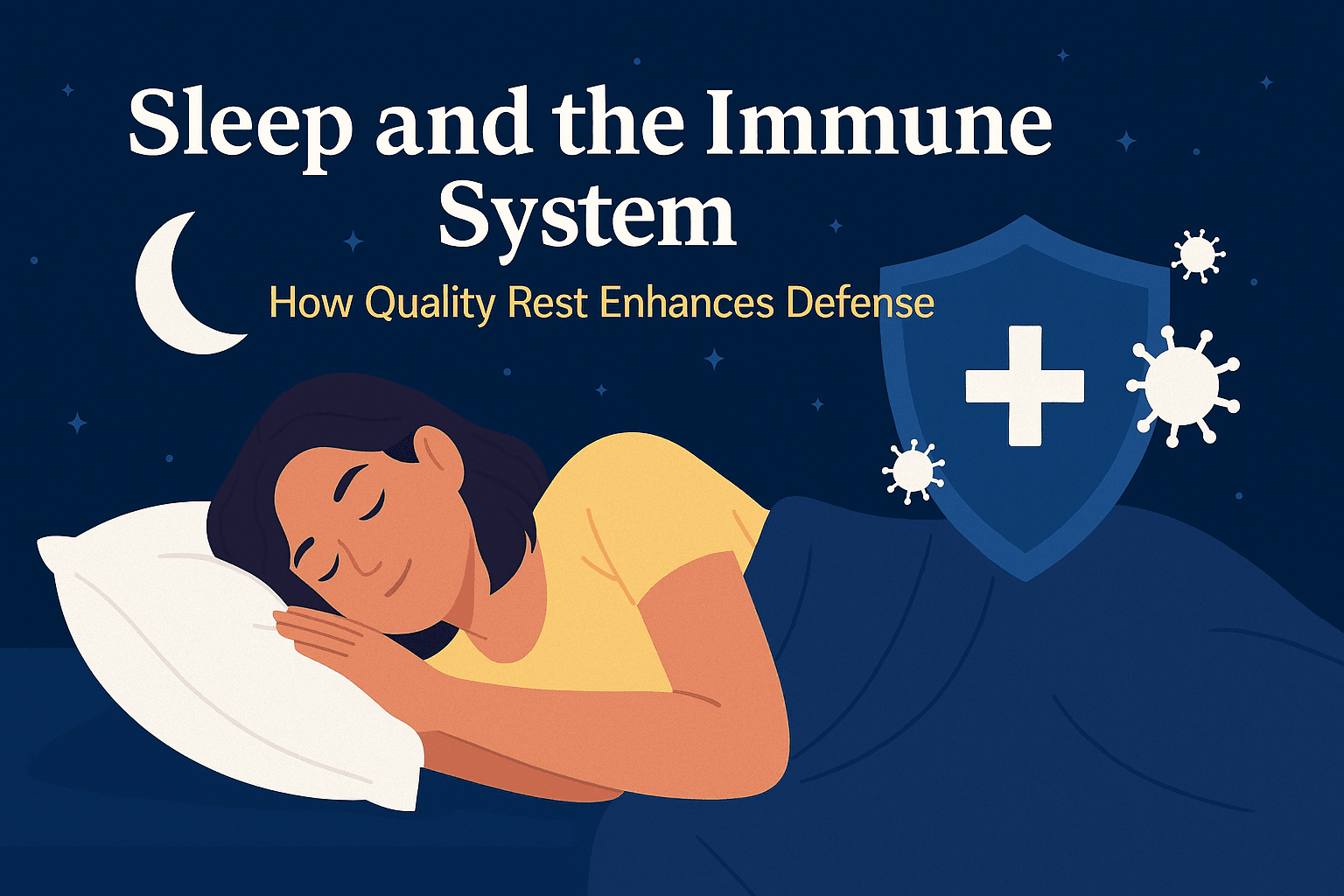Introduction
Sleep and the immune system are deeply connected, yet many people underestimate how much rest influences overall health. While you sleep, your body is not just “shutting down” — it is actively repairing tissues, producing immune cells, and releasing proteins that help fight infection. Without enough quality sleep, your immune system becomes less efficient, making you more vulnerable to colds, flu, and even chronic inflammation.
In this article, we will explore the fascinating relationship between sleep and the immune system, understand why rest is essential for recovery, and learn how to optimize your nightly routine to strengthen your body’s natural defenses.
1. Why Sleep Is Essential for the Immune System
The relationship between sleep and the immune system is deeply intertwined. Quality rest is not just about feeling refreshed—it is a biological necessity that allows the immune system to function at its peak. When you sleep, your body goes through different stages — including non-REM and REM — each with specific roles in immune regulation and defense.
During non-REM deep sleep, the body produces and releases cytokines, proteins that target infection and inflammation, directly strengthening the link between sleep and the immune system. In contrast, REM sleep supports memory consolidation, including the immune system’s “memory” of past invaders, which helps it respond faster and more efficiently to future threats.
A landmark study from the University of California found that individuals sleeping less than 6 hours a night were four times more likely to catch a cold compared to those who slept at least 7 hours. This evidence strongly suggests that both the quantity and quality of sleep and the immune system’s function are directly connected.
Key immune benefits of adequate sleep:
- Cytokine Production: Promotes the release of infection-fighting proteins.
- T-Cell Activation: Improves the efficiency of T-cells, which destroy infected cells.
- Antibody Response: Enhances the body’s ability to respond to vaccines.
When sleep is disrupted, these protective processes weaken, leaving you more susceptible to acute illnesses like colds and flu, as well as long-term health problems. Prioritizing good sleep and the immune system connection through healthy habits can be one of the most effective ways to boost overall immunity.

2. How Sleep Deprivation Weakens the Immune System
When you consistently fail to get enough sleep, the connection between sleep and the immune system becomes painfully evident. Sleep deprivation disrupts the production of infection-fighting cytokines, slows down T-cell activation, and weakens antibody formation, all of which are essential for your body’s defense.
Research shows that even a single night of poor sleep can impair the immune system’s ability to respond to pathogens. In fact, studies on vaccines have revealed that people who slept fewer than 6 hours before getting a flu shot had a weaker antibody response compared to those who had at least 7–8 hours. This demonstrates how tightly sleep and the immune system are linked in both short-term and long-term immunity.
Lack of proper rest also elevates stress hormone levels, particularly cortisol, which can suppress immune activity. Over time, chronic sleep loss leads to systemic inflammation — a factor connected not only to frequent colds but also to serious conditions like heart disease, diabetes, and even certain cancers.
By understanding the risks of inadequate rest, you can better appreciate how vital it is to protect the balance between sleep and the immune system for lasting health.
3. How Deep Sleep Strengthens Your Immune Defenses
When you consistently fail to get enough rest, the connection between sleep and the immune system becomes painfully clear. Sleep deprivation disrupts the production of infection-fighting cytokines, slows down T-cell activation, and weakens antibody formation — all critical components of your body’s defense. This shows how directly sleep and the immune system interact to protect your health.
Research indicates that even a single night of inadequate sleep can impair the immune system’s ability to fight pathogens. Studies on vaccines demonstrate that people who slept fewer than 6 hours before receiving a flu shot developed a much weaker antibody response compared to those who got 7–8 hours. This reinforces that sleep and the immune system are tightly linked for both short-term resistance and long-term immunity.
Insufficient rest also increases stress hormones, especially cortisol, which can suppress immune activity. Over time, chronic lack of sleep promotes systemic inflammation — a condition associated not only with frequent colds but also with serious illnesses like heart disease, diabetes, and certain cancers. By prioritizing rest, you help maintain the vital balance between sleep and the immune system, ensuring your body is ready to defend against threats today and in the future.
4. REM Sleep, Hormonal Balance, and Stress Regulation
While deep sleep focuses on physical restoration, REM sleep (Rapid Eye Movement) plays a critical role in emotional regulation and hormonal stability — both of which have a direct impact on the connection between sleep and the immune system.
Key immune-related benefits of REM sleep include:
- Stress Hormone Regulation: REM sleep helps keep cortisol levels balanced. Chronic high cortisol can suppress immune responses, showing how sleep and the immune system are closely linked through stress management.
- Balancing Appetite Hormones: Adequate REM sleep regulates ghrelin (hunger hormone) and leptin (satiety hormone), indirectly supporting immunity by preventing unhealthy eating patterns triggered by fatigue.
- Emotional Stability: A calm, well-regulated nervous system reduces chronic inflammation — a silent threat to immune health and another reason why quality sleep and the immune system go hand in hand.
📚 Scientific Insight: A 2019 study in The Lancet Psychiatry revealed that poor REM sleep increases the risk of mood disorders, which are associated with higher inflammation markers and reduced immune efficiency.
How to Improve REM Sleep:
- Avoid alcohol before bed — it shortens REM cycles and decreases overall sleep quality.
- Get morning sunlight exposure — this helps set your circadian rhythm, which regulates REM patterns and strengthens the link between sleep and the immune system.
- Exercise regularly — but avoid intense workouts right before bedtime.
- Manage stress before bed — practices like meditation, journaling, or prayer help lower nighttime cortisol.
💡 Tip: If you wake up feeling emotionally drained or irritable despite getting enough sleep hours, you may not be achieving restorative REM cycles, which can weaken the benefits of sleep and the immune system working together.
5. Chronic Sleep Deprivation and Immune Suppression
When poor sleep becomes a long-term pattern rather than an occasional issue, the connection between sleep and the immune system becomes painfully clear. Chronic sleep deprivation — consistently getting less than the recommended 7–9 hours per night — disrupts multiple defense mechanisms simultaneously.
Major effects on immunity:
- Reduced White Blood Cell Production: Lack of rest lowers lymphocyte production, which are essential for fighting viruses and bacteria. This shows how strongly sleep and the immune system work together to protect the body.
- Lower Antibody Response: Studies indicate that individuals sleeping less than 6 hours before vaccination produce less than half the antibodies compared to those who rest well, proving that sleep and the immune system are intertwined in vaccine effectiveness.
- Increased Inflammation: Persistent sleep debt elevates C-reactive protein (CRP) and interleukin-6 (IL-6), markers of chronic inflammation that weaken immune defenses.
- Disrupted Immune Memory: Without proper rest, the immune system’s ability to “remember” pathogens declines, making the body more vulnerable to repeat infections.
📚 Scientific Insight: Research from the University of California, San Francisco, found that people sleeping fewer than 6 hours per night were four times more likely to catch a cold after exposure to the virus compared to those sleeping more than 7 hours — a striking example of how sleep and the immune system directly affect illness risk.
How to Recover from Chronic Sleep Debt:
- Prioritize sleep consistency — go to bed and wake up at the same time daily, including weekends.
- Limit caffeine after midday — to avoid delays in deep and REM sleep cycles.
- Take short naps (20–30 minutes) if necessary, but avoid long naps late in the day.
- Gradually extend sleep time — adding 30–60 minutes per night until you reach 7–9 hours, helping restore the healthy relationship between sleep and the immune system.
💡 Tip: If you have been chronically sleep-deprived, full immune recovery won’t happen overnight. It may take several weeks of consistent, high-quality rest for sleep and the immune system to regain peak performance.
6. Good Sleep Hygiene to Support the Immune System
Good sleep hygiene means creating the right environment and habits for restorative rest. This isn’t just about feeling energized the next day — it directly impacts the connection between sleep and the immune system, strengthening your body’s natural defenses.
Key strategies to improve sleep and the immune system:
Create a Sleep-Friendly Environment
- Keep your bedroom dark, quiet, and cool (18–20°C is ideal).
- Use blackout curtains or an eye mask to block light, and earplugs or white noise to minimize disturbances.
- Reserve your bed for sleep and intimacy only — avoid working or scrolling in bed to keep sleep and the immune system aligned.
Set a Consistent Routine
- Go to bed and wake up at the same time daily to support your circadian rhythm.
- Establish a relaxing pre-sleep ritual — reading, stretching, or listening to calming music can help regulate sleep and the immune system.
Optimize Evening Nutrition
- Avoid heavy meals, alcohol, and caffeine close to bedtime.
- If hungry, opt for a light snack rich in tryptophan (banana, warm milk, nuts) to boost melatonin production and indirectly support sleep and the immune system.
Limit Blue Light Exposure
- Reduce screen time 1–2 hours before bed.
- If you must use devices, activate night mode or wear blue light–blocking glasses.
Manage Stress Before Sleep
- Practice deep breathing, meditation, or gentle yoga to calm your nervous system.
- Write down thoughts or tasks to clear your mind and improve sleep and the immune system connection.
📌 Immune Link: Quality sleep ensures the release of cytokines — proteins that fight infection and regulate inflammation. Missing sleep disrupts this process, weakening the relationship between sleep and the immune system and lowering your resistance to illnesses.
Conclusion
Sleep and the immune system are inseparably connected — sleep is not just rest, but an active, regenerative process vital for keeping your body’s defenses strong. From supporting white blood cell production to regulating inflammation and reinforcing immune memory, adequate sleep is one of the most powerful natural shields we have against illness.
By prioritizing sleep and the immune system through consistent sleep hygiene, you can reduce the risk of infections, recover faster when sick, and improve overall health. When combined with balanced nutrition, regular physical activity, and effective stress management, good sleep becomes one of your most reliable “medicines” for lifelong wellness.
FAQ
Q1: How does sleep strengthen the immune system?
A1: Sleep boosts immune function by increasing cytokine production, improving white blood cell activity, and regulating inflammation.
Q2: Can lack of sleep make me sick?
A2: Yes, chronic sleep deprivation weakens immune defenses, making you more vulnerable to colds, flu, and other infections.
Q3: What’s the ideal amount of sleep for immunity?
A3: Most adults benefit from 7–9 hours of quality sleep per night to support optimal immune function.
Q4: Which habits improve sleep quality?
A4: Maintaining a consistent sleep schedule, limiting blue light exposure, and creating a calm bedroom environment all help improve sleep.
